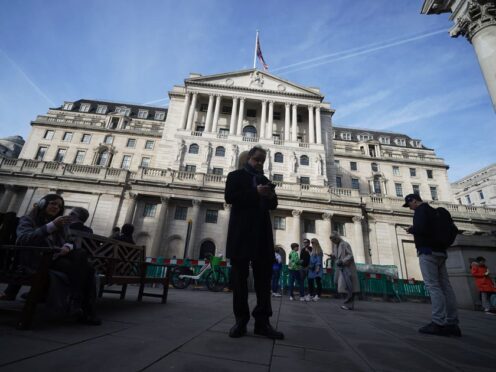
The Bank of England is being urged to step up its work to align the financial sector with UK climate goals.
In a letter to Governor Andrew Bailey on Monday, more than 50 leading economists and campaign groups warned the Bank is slipping behind other major central banks as its work on key green measures slows.
The letter said: “With the world having now reached the pivotal point of the first year-long breach of the 1.5C warming limit committed in the Paris Agreement, delays are no longer tenable.”
Former intergovernmental panel on climate change lead author Julia Steinberger, former UK sustainable development commission chair Jonathon Porritt, the WWF, Green Alliance and industry coalition bankers for net zero are among the signatories.
They wrote they are “extremely disappointed” that the Bank has reduced resources towards climate change work.
Speaking at the recent Lords Economic Affairs Committee, Mr Bailey said the decision came after the Treasury changed its list of priorities for the financial services sector.
The Treasury wrote to the Bank’s financial policy committee (FPC) in November, saying work to “align private sector financial flows with environmentally sustainable and resilient growth” would no longer be a priority.
In their letter, however, the economists and activists noted that climate remains within the FPC’s core mandate for financial stability and remains within the Government’s broader economic policy objectives.
“Such a change should not undermine the Bank’s work in this area,” they wrote.
“We therefore urge you to reprioritise work to align the financial sector with the Government’s climate goals, reverse resource cuts for this work and reassert the Bank of England as a climate leader as a matter of urgency.”
The signatories emphasised that climate change and environmental degradation more widely present a major risk to the Bank’s duty to maintain price stability.

The letter coincides with Mr Bailey’s fourth anniversary as governor of the Bank and comes shortly after the three-year anniversary of its monetary policy committee being awarded a green mandate.
It acknowledged the Bank’s early progress on climate change, including measures like the corporate bond purchase scheme, climate-related conditions for the energy markets financing scheme and its own climate-related financial disclosures.
The signatories warned that progress beyond these first steps on stress testing and disclosures appears to have stalled.
They said other major central banks have outpaced the Bank of England on this agenda in the last four years.
The letter said: “Major central banks have now begun adjusting collateral frameworks and capital requirements to reflect climate risks and momentum is building towards the use of green-term funding schemes to incentivise green lending.
“Progress made by other central banks also reflects mounting evidence that attempts to model the financial risk posed by climate change and biodiversity loss are failing woefully to reflect climate science, requiring a precautionary approach.”
It comes as the Bank prepares to release its latest decision on interest rates on Thursday when it is expected to hold them steady at 5.25%.
A Bank of England spokesperson said “Work on the financial risks and macro-economic impacts from climate change remains a priority for the Bank.
“Its work in this space is rooted in delivering its core mandate of price and financial stability.
“The November 2023 HM Treasury remit letter for the Bank’s Financial Policy Committee includes less emphasis on working with Government on the UK’s transition to net zero in areas less intrinsic to its objectives.”

Enjoy the convenience of having The Sunday Post delivered as a digital ePaper straight to your smartphone, tablet or computer.
Subscribe for only £5.49 a month and enjoy all the benefits of the printed paper as a digital replica.
Subscribe